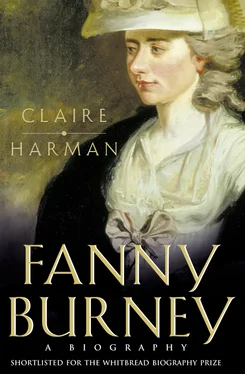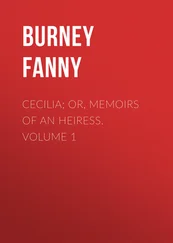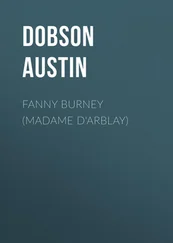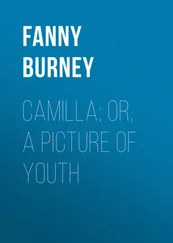Unfortunately, there was one area where Crisp’s clear acumen and delicate discrimination failed him, and where he was not content with the status of gifted amateur. He was convinced that he was a dramatic poet, and by 1754 had finished his magnum opus , a tragedy in verse called Virginia (based on the story in Livy, retold by Chaucer in The Physician’s Tale ) which he had been writing for at least five years. He offered it to his friend David Garrick for production at Drury Lane, and season after season expected it to be put on, but Garrick prevaricated. Sure of his play’s merits, Crisp decided to put pressure on Garrick through his influential friends. He got the Earl of Coventry to give a copy of it to the Prime Minister, Pitt the Elder, who said it was ‘excellent’ 16 and persuaded the Earl’s wife, Lady Coventry, to take the manuscript back to Garrick personally. This was ‘a machinery such as none could long resist’, as Lord Macaulay wrote of the incident. 17 Lady Coventry ( née Gunning) was one of the famous beauties of the day, idolised like a latter-day film star; she and her sister were followed by crowds of admirers, seven hundred of whom, reportedly, once waited outside an inn just to catch sight of them. 18 When she came bearing Virginia , Garrick had to concede to the power of Crisp’s manoeuvring. He agreed to put the play on in the spring of 1754, although he insisted on cutting some scenes, by which, as even the author was prepared to admit, it was ‘rendered much more Dramatic than it was at first’. 19 Garrick took the role of Virginius himself, with Mrs Cibber as his daughter, the tragic heroine; but despite their best efforts, the play lasted only ten nights – not a disaster, by any means, but a sharp disappointment to Crisp, who thought he had given birth to a classic.
Crisp spent the next year revising Virginia , and took mortal offence when Garrick, unsurprisingly, expressed no interest in a revival. Crisp complained of Garrick’s ill-will, his friends’ lack of enthusiasm, the fickleness of the public – anything but admit that there might be something wrong with the work. ‘The fatal delusion that he was a great dramatist, had taken firm possession of his mind’, Macaulay wrote. ‘He lost his temper and spirits, and became a cynic and hater of mankind.’ 20 Crisp came to regret that he had ever allowed Garrick to alter a line of Virginia , and thirty years later was still smarting from the play’s failure, convinced that he had only missed out on literary glory through other people’s errors of judgement. Sending the surviving segments of the play to Fanny Burney after Crisp’s death, his sister, Sophia Gast, gave her own version of the affair: ‘The then manager [Garrick] would not suffer the too much approved, and greatly admired performance, to be acted as in its pristine state, but insisted on many alterations’. Garrick’s motivation was clear to Mrs Gast: simple jealousy. Fanny Burney, who had known both Garrick and Crisp very well, and was loyal to the memory of both, scored the word through. 21
Crisp left England for Italy in 1755, not intending to return. However, after a few years’ self-imposed exile he came back to live a life of retirement ‘in one of the wildest tracts of Surrey’. 22 This was the hamlet of Chesington, * about two miles north-west of Epsom (now a heavily-developed suburb just inside the London orbital motorway), where he took up residence as a long-term paying guest in a decaying country house belonging to one of his bachelor acquaintances, Christopher Hamilton.
Chesington Hall was falling into ruin when Christopher Hamilton took it over from the Hatton family in 1746. Fanny Burney calls him the ‘hereditary owner’, but she could have been wrong about this, † as she was about ‘the long dignity’ of the house’s name, which Hamilton himself had made up in the 1740s. 23 Fanny tended to romanticise everything about Chesington, the ‘long-loved rural abode [where] the Burneys and happiness seemed to make a stand’, 24 and it is easy to see how the Tudor house, with its old wood, old windows and curious passageways, would have appealed to an imaginative child. It was built of brick around 1520 and had retained most of its early features, including a long gallery on the first floor, tapestries, canopied beds, carved cupboards and a chimney-piece ‘cut in diamonds, squares and round nobs, surmounting another of blue and white tiles’. 25 The windowpanes were ‘hardly so wide as their clumsy frames’, and were ‘stuck in some angle close to the ceiling of a lofty slip of a room’, or looked out from the attics onto ‘long ridges of lead that entwined the motley spiral roofs of the multitude of separate cells’. A crumbling Elizabethan ‘cell’ was just what Samuel Crisp was looking for, and he was glad to adopt what Fanny later described as ‘some pic-nic plan’ 26 with Hamilton, joining a number of other waning gentlemen at Chesington Hall ‘who had quitted the world, and who in this Chateau met only at meals, at Tea, and afterwards at a game of cards’. 27
Crisp’s retirement was not complete, and he came up to town every spring to visit the latest exhibitions and attend plays, concerts and the opera. It was on one of these trips that he re-met Charles Burney and quickly re-established their friendship. They had been out of touch during the period of the Virginia episode, when Burney had finally taken his friend’s advice and moved back to London from King’s Lynn – the period, too, during which Esther had died. The sight of the young music-master, as thin and overworked as ever, heroically trying to maintain his household in Poland Street, must have touched Crisp deeply. Burney was the only one of his friends to whom he divulged the secret of how to find Chesington Hall, and it soon became a refuge where the musician could retire to work, or simply stroll among the box-walks or the fruit trees, or admire a good view of Epsom from the summer-house on the ‘Mount’.
On the death of Christopher Hamilton, Chesington Hall passed to his sister Sarah, who, guided by Crisp’s advice, let half the house and most of the surrounding land to a farmer named Woodhatch, retaining the other part as ‘a competant establishment for receiving a certain number of boarders’. 28 * Crisp became, in effect, the head of a household that consisted of himself, Mrs Hamilton, † her good-natured niece Kitty Cooke, and a shifting cast of lodgers. The Burneys were always welcome, and over the years Chesington Hall became a second home, especially when any of them needed a convalescent ‘change of air’. Crisp took great interest in all the children, but was particularly fond of Fanny, who returned his affection abundantly. She was an adolescent who sometimes behaved like an ‘old lady’; he an old gentleman who like to indulge youthful high spirits. Genial, cultivated and attentive, Crisp became a kind of ideal grandfather to the Burney children, a second ‘Daddy’ – the pet name he was more than happy to adopt.
In the year during which Hetty and Susan were away in Paris, Fanny had the house on Poland Street to herself for long stretches of time. She was twelve years old, had free access to her father’s growing library, and was keen to improve herself. She studied conscientiously, made notes, copied extracts and kept a catalogue raisonné , possibly in competition with her two sisters abroad. A long manuscript translation from the French of Fontanelle’s ‘Entretien sur la pluralité des mondes’ has survived 30 which may have been made during these years: it indicates the seriousness of Fanny’s studies, her ambition and also her characteristic self-consciousness – underneath the title appear the words ‘Murdered into English by Frances Burney’.
Читать дальше












